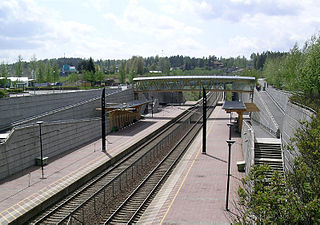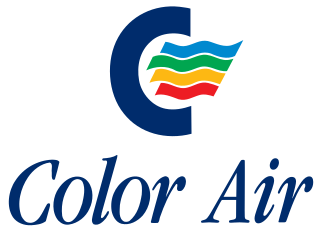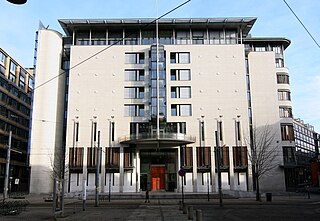
Transport in Norway is highly influenced by Norway's low population density, narrow shape and long coastline. Norway has old water transport traditions, but road, rail and air transport have increased in importance during the 20th century. Due to the low population density, public transport is somewhat less built out in rural areas of Norway, however public transport in and around cities is well developed.

The Gardermoen Line is a high-speed railway line between Oslo and Eidsvoll, Norway, running past Lillestrøm and Oslo Airport, Gardermoen. The line is 64 kilometres (40 mi) long and replaced the older Hoved Line as the main line north-east of Oslo. The older Hoved Line now handles commuter and freight traffic, while the Gardermoen Line handles high-speed passenger trains and freight trains laden with jet fuel for the airport. Both lines are owned by Bane NOR.

Color Air AS was the first Norwegian low-cost airline. It operated from Oslo Airport, Gardermoen in 1998 and 1999 with a fleet of three Boeing 737-300 aircraft. Color Air was a brand extension of Color Line, which shared a common owner in the Olav Nils Sunde-controlled Color Group. The airline operated five daily round trips from Oslo to Trondheim and Bergen, four to Ålesund and one to London, in addition to a weekly trip to Alicante. Color Air pioneered the low-cost business model in Norway, with a denser seating, no frills and lack of a frequent flyer program. Tickets were sold only via the Internet, by telephone or in supermarkets; when bought from travel agents, there was a 200 kr surcharge.
Jernbaneverket was a government agency responsible for owning, maintaining, operating and developing the Norwegian railway network, including the track, stations, classification yards, traffic management and timetables. Safety oversight was the duty of the Norwegian Railway Inspectorate, while numerous operating companies run trains on the lines; the largest being the state owned passenger company Vy and the freight company CargoNet.

Moss Airport, Rygge was a minor international airport serving Moss, Oslo and Eastern Norway. It is located in Rygge in Moss Municipality, 10 kilometres (6.2 mi) outside Moss and 60 kilometres (37 mi) outside Oslo. It also served as a regional airport for Østfold county and owned and was operated by the private company Rygge Sivile Lufthavn AS.

Norkring AS is a provider of digital terrestrial television and radio transmitting in Norway and Belgium. In Norway, Norkring operates a Digital Video Broadcasting – Terrestrial (DVB-T) network for Norges Televisjon, as well as an FM and Digital Audio Broadcasting (DAB) radio. In Belgium, Norkring operates a DVB-T, DVB-T2, FM, DAB and DAB+ network. It operated a DVB-T network in Slovenia between 2010 and 2012. Norkring is owned by Telenor; Norkring België is owned 75 percent by Norkring and 25 percent by Participatiemaatschappij Vlaanderen.

The Norwegian Public Roads Administration is a Norwegian government agency responsible for national and county public roads in Norway. This includes planning, construction and operation of the national and county road networks, driver training and licensing, vehicle inspection, and subsidies to car ferries.

Norwegian Coastal Administration is a Norwegian government agency responsible for the water transport infrastructure along the 9,200 km Coast of Norway. It is responsible for coastal navigation infrastructure, pilotage and harbour and port infrastructure, including lighthouses. The agency is led by the Coastal Directorate (Kystdirektoratet) and is subordinate to the Ministry of Fisheries and Coastal Affairs. The main office is in Ålesund.
The Government agencies of Norway are state-controlled organizations that act independently to carry out the policies of the Government of Norway. The government ministries are relatively small and merely policy-making organizations, allowed to control agencies by policy decisions but not by direct orders. A minister is explicitly prohibited from interfering with the day-to-day operation in an agency or the outcome in individual cases. While no minister is allowed to give orders to agencies personally, they are subject to decisions made by the government. Also, the minister is normally the instance of appeals for agency decisions.
The Royal Ministry of Education and Research is a Norwegian government ministry responsible for education, research, kindergartens and integration. The ministry was established in 1814 as the Royal Ministry of Church and Education Affairs.

Norwegian Competition Authority is Norwegian Government agency responsible for managing the Competition Act of 2004, including regulations imposed through the European Economic Community. This includes regulating cooperation that hinders competition, misuse of a dominant market position and control of buy-outs and mergers. The authority is based in Bergen.
The Agency for Public Management and eGovernment or Difi is a government agency subordinate to the Norwegian Ministry of Government Administration and Reform.
The Oslo Package 2 or O2 is a political agreement for financing investments in public transport in Oslo and Akershus, Norway. The program ran from 2001 to 2011, and includes many large and small investments in railways, the Oslo Tramway, the Oslo Metro and infrastructure for buses. Total budget is 15.6 billion kr. The project is a cooperation between the transit authorities Oslo Sporveier and Stor-Oslo Lokaltrafikk, Oslo Municipality and Akershus County Municipality, and the government agencies of the Norwegian National Rail Administration and the Norwegian Public Roads Administration.

Oslo District Court is a district court located in Oslo, Norway. This court is based at the Oslo Courthouse in the city of Oslo. The court serves the entire city of Oslo and the court is subordinate to the Borgarting Court of Appeal. As the largest district court in Norway, it handles about 20% of all cases in the country. The court handled 3,000 criminal and 2,200 civil cases, as well as 7,200 summary proceedings in 2007.
Taxation in Norway is levied by the central government, the county municipality and the municipality. In 2012 the total tax revenue was 42.2% of the gross domestic product (GDP). Many direct and indirect taxes exist. The most important taxes – in terms of revenue – are VAT, income tax in the petroleum sector, employers' social security contributions and tax on "ordinary income" for persons. Most direct taxes are collected by the Norwegian Tax Administration and most indirect taxes are collected by the Norwegian Customs and Excise Authorities.

Norsk Spisevognselskap A/S, often abbreviated NSS or shortened to Spisevognselskapet, was a Norwegian state enterprise which operated restaurant carriages on Norwegian trains and restaurants at railway stations and railway hotels. The company was established in December 1918, and started a catering service in 1919. Originally owned by the Norwegian Trunk Railway, it was acquired by the state in 1926. Meals served in the restaurant carriages were relatively expensive, although they were available to all passengers. In the 1950s, the company began using serving trolleys on trains.
A/S Bergen Aviation was a Norwegian airline that never operated any scheduled flights. Based in Bergen and established in 1981, it operated 2 Piper Cheyenne 2 turboprop for charter. It was originally established by the Bird Technology Group and was acquired by As Nevi in the Vestagroup in 1983. This was a time when SAS did not service Bergen well except Oslo and Copenhagen further adding to Flesland's decline as an important airport.

Hans Christian Holte is a Norwegian civil servant.

Norwegian Customs is a Norwegian government agency under the Ministry of Finance with responsibility for "protecting society against illegal importation and exportation of goods and to ensure government revenues by correct and timely payment of duties and taxes". Since 2017, the agency has been run by customs director Øystein Børmer.
The national identity number is a unique eleven-digit unique identifier issued to residents and citizens of Norway. The issuing of the identity number corresponds to being registered in the national population register. The ID number is used throughout government administration and a number of private sector services, in particular banking and insurance. All official IDs, including passports, national ID cards, driving licenses and bank cards contain the National Identity Number.












